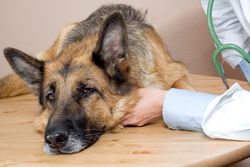
While snow and colder temperatures can offer opportunities for memorable experiences with your pets, the winter season can negatively impact your animal's health. Just like humans, freezing temperatures and prolonged exposure to winter air and weather can cause significant health issues. If your pet appears to be sick, you should take them to an animal clinic as soon as possible. Below are three common health issues to look out for in your pets this season.
Common Health Issues Pets Could Face During Winter
1. Hypothermia
Taking your dog out for a walk or letting your cat wander in the yard during the winter months can make them sick. If your animal is left outside in freezing temperatures, their body could go into hypothermic shock. Hypothermia occurs when the body temperature gets too low after being in a cold environment. If a dog or cat has diabetes, heart ailments, or other pre-existing conditions, they are more susceptible to hypothermia even if you don’t think it’s that cold out. Look out for the symptoms in your pet, which include shivering, lethargy, depression, restlessness, and weakness. If hypothermia is severe, their muscles will stiffen, and their heart rate will slow down. To monitor your animal's temperature, check it rectally with a thermometer. Any reading below 95 degrees is a sign of hypothermia in your pet, and you’ll need to get them to an animal clinic or hospital.
2. Kennel Cough
 If you’re going away for a trip during the winter and you can’t bring your animal with you, you’re probably going to take your pet to a boarding facility. When your dog stays at one of these boarding facilities, they’re susceptible to catching kennel cough, an infectious tracheobronchitis. Cold air and germs increase a dog’s chance of developing the kennel cough virus, which is caused by bacteria. The main symptom of kennel cough is a “goose-like” cough when your dog tries to bark. A mild case can be treated with a humidifier and rest, but an animal clinic or veterinarian should address more severe cases.
If you’re going away for a trip during the winter and you can’t bring your animal with you, you’re probably going to take your pet to a boarding facility. When your dog stays at one of these boarding facilities, they’re susceptible to catching kennel cough, an infectious tracheobronchitis. Cold air and germs increase a dog’s chance of developing the kennel cough virus, which is caused by bacteria. The main symptom of kennel cough is a “goose-like” cough when your dog tries to bark. A mild case can be treated with a humidifier and rest, but an animal clinic or veterinarian should address more severe cases.
3. Antifreeze Poisoning
In cold temperatures, many people will use antifreeze products that protect your vehicle and prevent your car engine from freezing up. Homeowners also use it to protect pipes in the winter. However, a chemical in antifreeze – ethylene glycol – can poison pets very quickly if it isn’t stored correctly. The additive has a sweet taste, which attracts animals. Prevent your cat or dog from consuming antifreeze by storing all hazardous chemicals in a secure cupboard. Clean up any chemical spills that your animal can reach. If you think your animal has antifreeze poisoning, they may seize, vomit, struggle to walk, or fall into a coma. If this happens, get your pet to an animal clinic or hospital immediately.
If you’re concerned that your pet has an illness this winter, consult a trusted medical professional at Mt. Washington Animal Clinic in Bullitt County, KY. For more than 40 years, the veterinary hospital has served Kentuckians and their animals with compassion and excellence. To make an appointment for your pet, call (502) 955-6822 today or visit their website for a full list of their services.
About the Business
Have a question? Ask the experts!
Send your question

